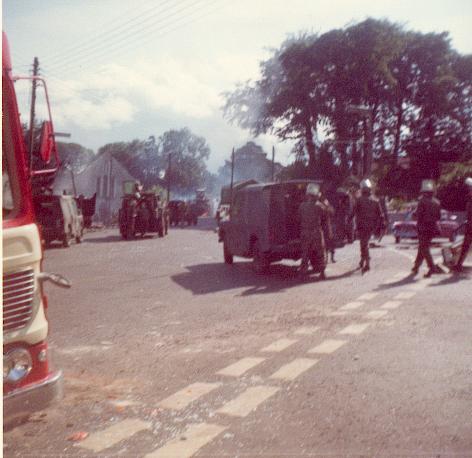My younger son rang me the other day to ask what was meant by the ‘
As he is in his mid-twenties I had naturally assumed that history so recent would be known well to him (he is not uninformed or unintelligent!). I was wrong. Perhaps this true story from our frequent contributor Sean Maguire might help to enlighten him.
‘As a young child I lived in
Many of the houses in our street were on fire. The area had been under attack for almost two days from loyalist mobs. In the end most local people, including my family, were forced to flee their homes with little or no possessions.
I remember distinctly gazing from the rear window of my uncle Paddy’s car at British troops holding back groups of men attempting to reach the burning houses with buckets of water. At the top of the street two fire engines were marooned, hemmed in by armoured cars.
My last glimpse of our street was of a mixture of orange flames and black smoke shrouding the skyline.
We had travelled about twenty minutes to the outskirts of Lisburn when we were stopped at a British Army checkpoint. Despite the warm July sunshine the soldiers sported blackened faces – which reinforced their menacing demeanour. Ordering us all out of the car they began shouting and acting very aggressively.
My father and my uncle Paddy were forced to lie spread-eagled across the bonnet of the car. My mum was pushed by a female soldier who insisted on searching my baby sister’s shawl for ‘concealed weapons‘. The same soldier came over to me and prised my little blue suitcase from my trembling hands and emptied the contents on the road. My father had to be twice physically restrained from coming to the aid of my mother and me.
I could not understand why we were being subjected to this treatment. After all it was not us that had been burning houses. I couldn’t make out the abusive swear words they kept repeating to my dad and uncle Paddy – but I knew that they were wrong. Mrs Brady, my teacher would have sent them all to Father Murphy for ‘confession’. I had just made my First Communion so I was in the early stages of the ‘Catholic guilt trip’!
When I look back to this incident and to childhood generally, there is always a temptation to think about the weather. This is every bit as puzzling as the desire to reminisce although the weather is always a focal point of conversation in
That summer evening was warm but with a cooling breeze. I was however convinced that there were huge black clouds sitting above our heads waiting to erupt at any minute – to punish the soldiers for tormenting us.
My mum was very upset and could not conceal her emotions. Our journey would take us to family friends of hers outside
Ever since that day I have always hoped that clouds would burst at British Army checkpoints, as a reciprocal, meteorological gesture!
I am sure it has happened – but you can never rely on the weather in this country!’
